Pastor Resume Examples

Mar 31, 2025
|
12 min read
"Create a divine pastor resume to shepherd your career path and show your calling. Learn how to highlight your experiences and faith-driven journey effortlessly, ensuring your application resonates with potential congregations."
Rated by 348 people
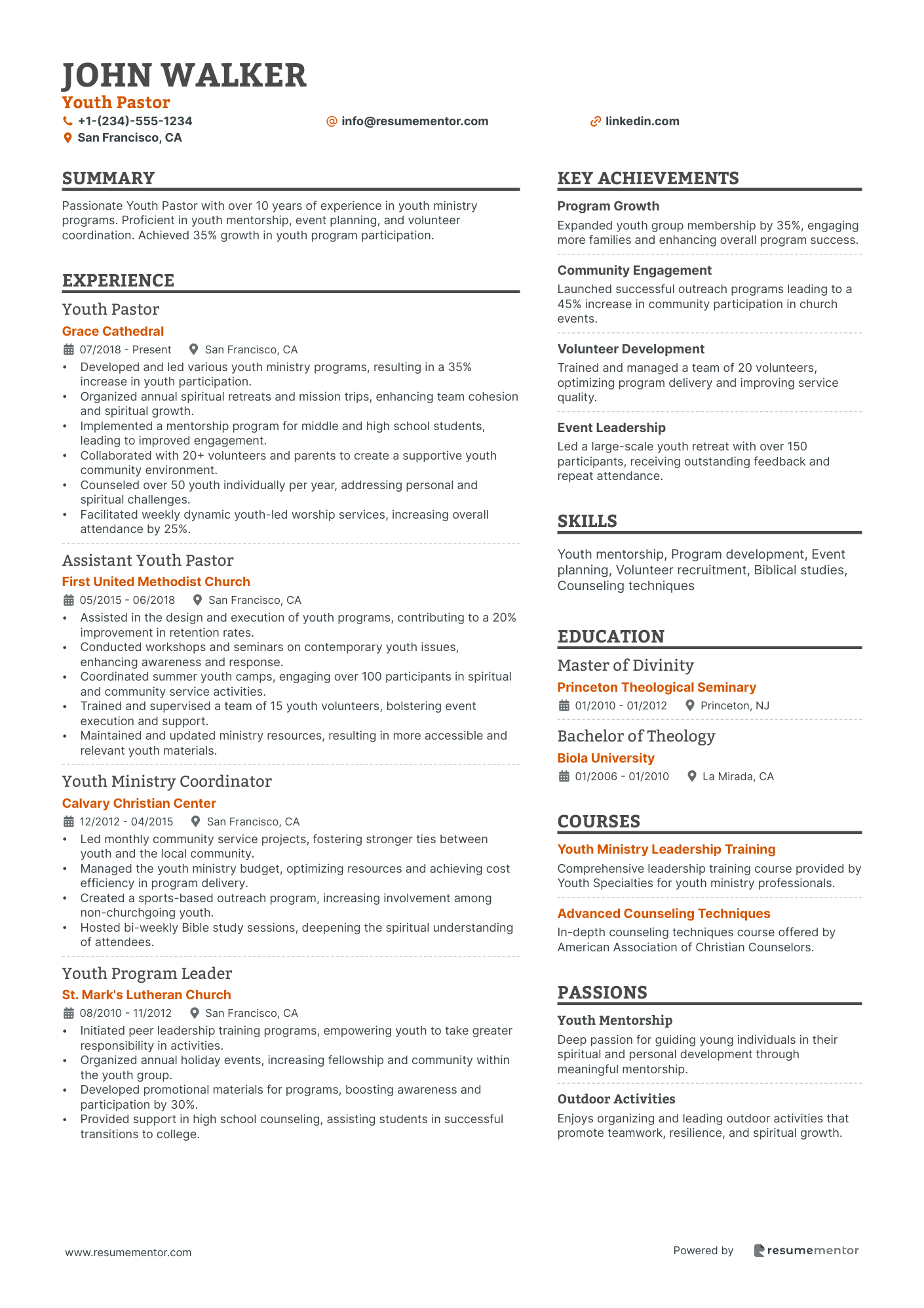
Youth Pastor
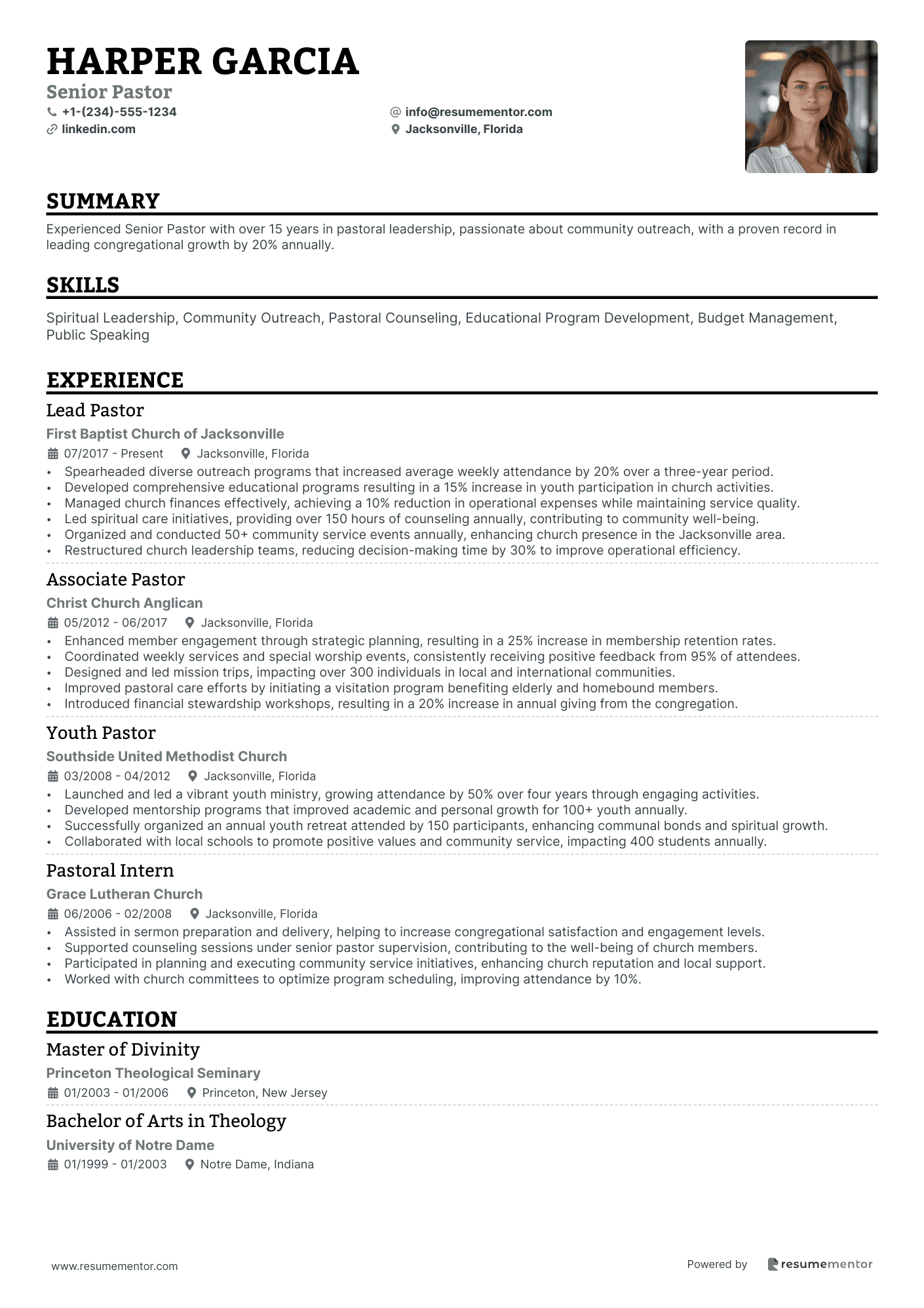
Senior Pastor
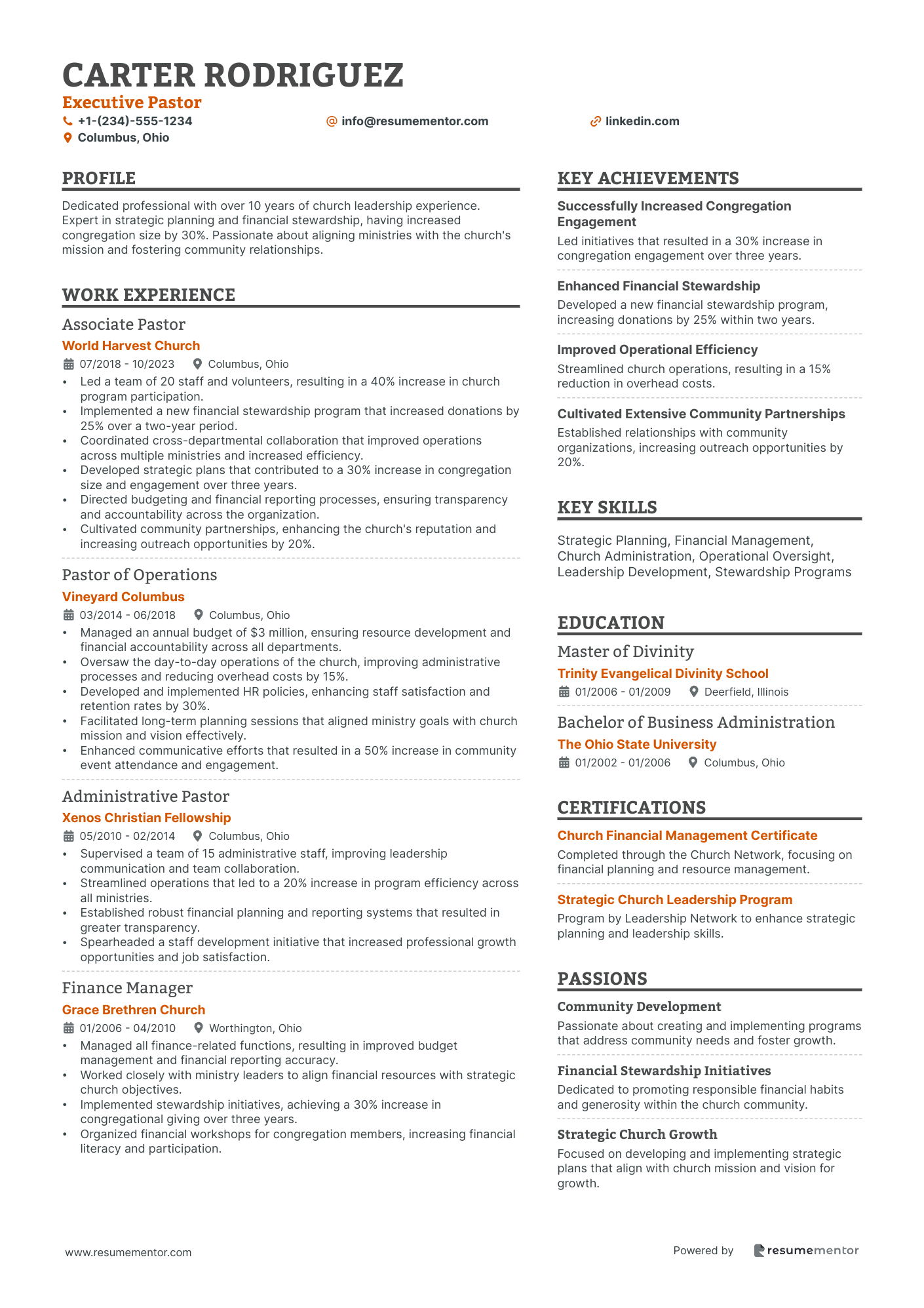
Executive Pastor
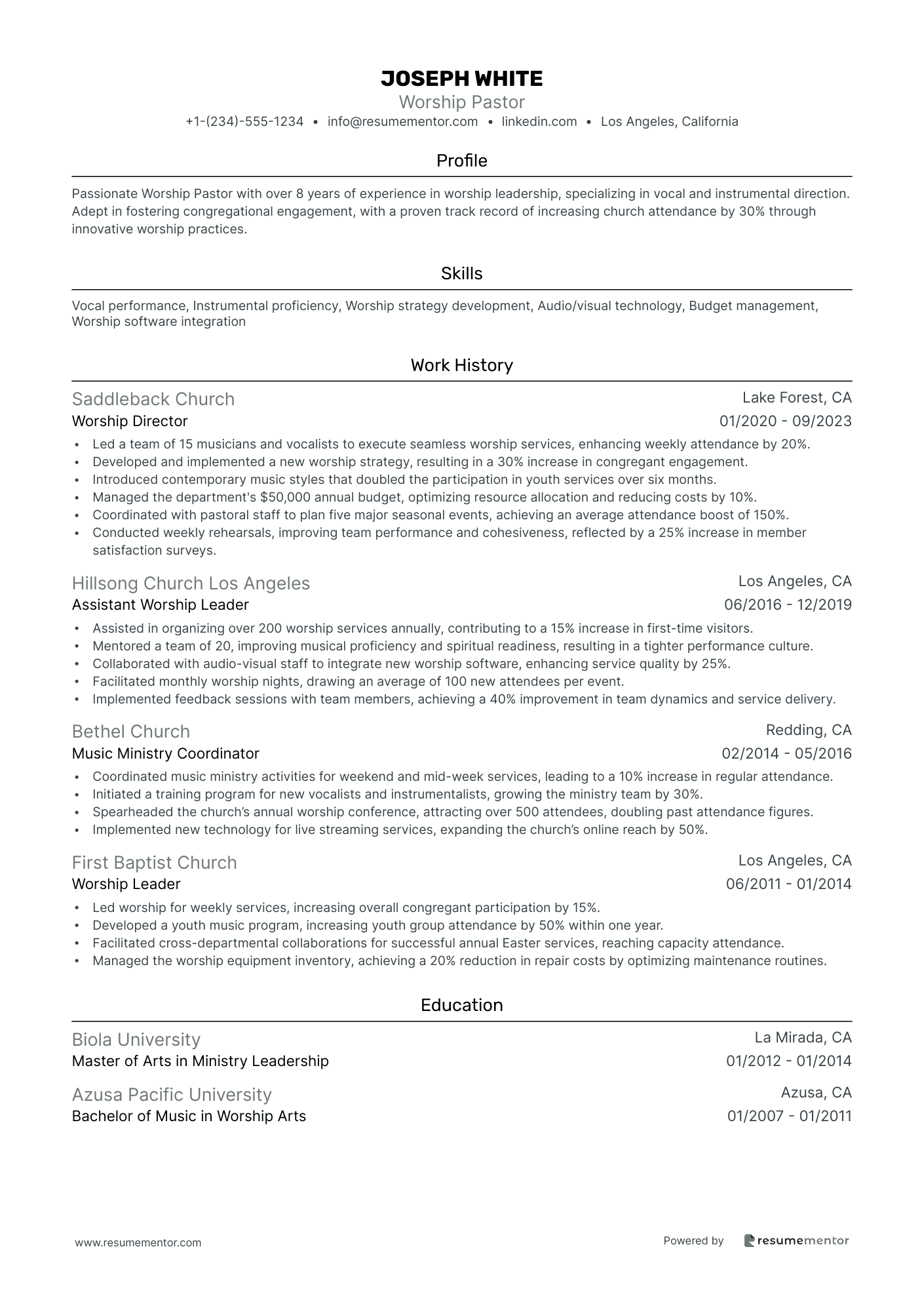
Worship Pastor
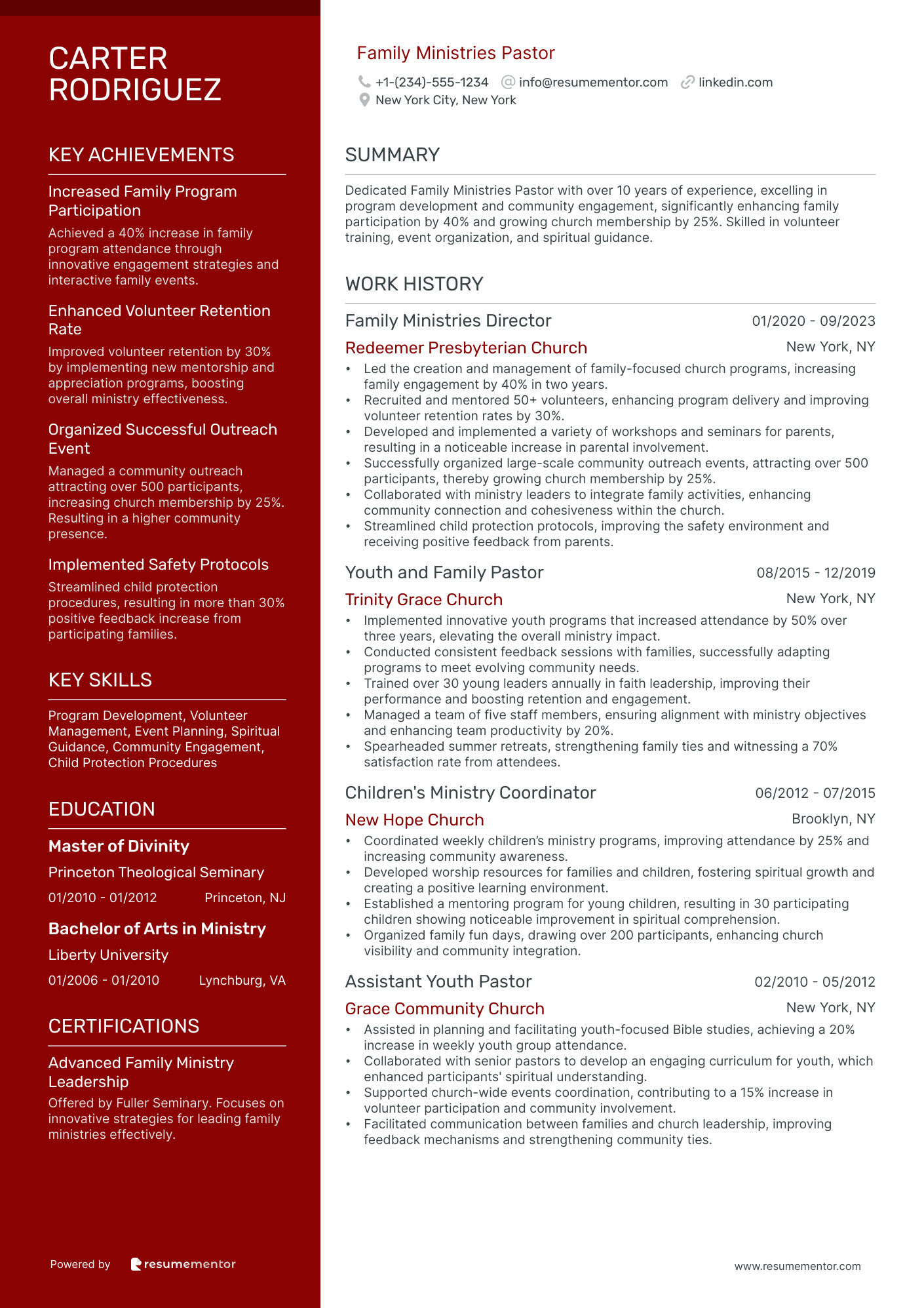
Family Ministries Pastor
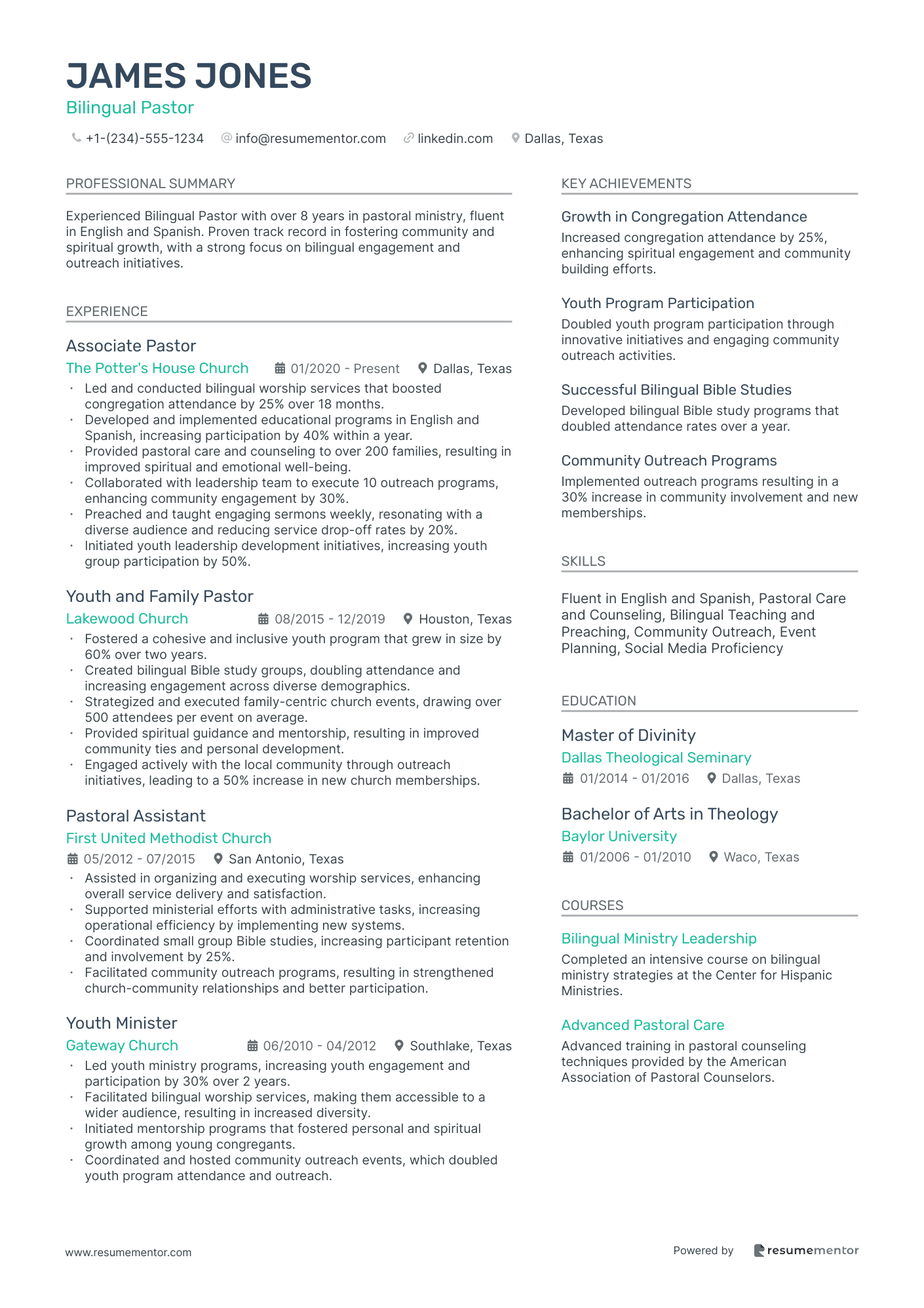
Bilingual Pastor
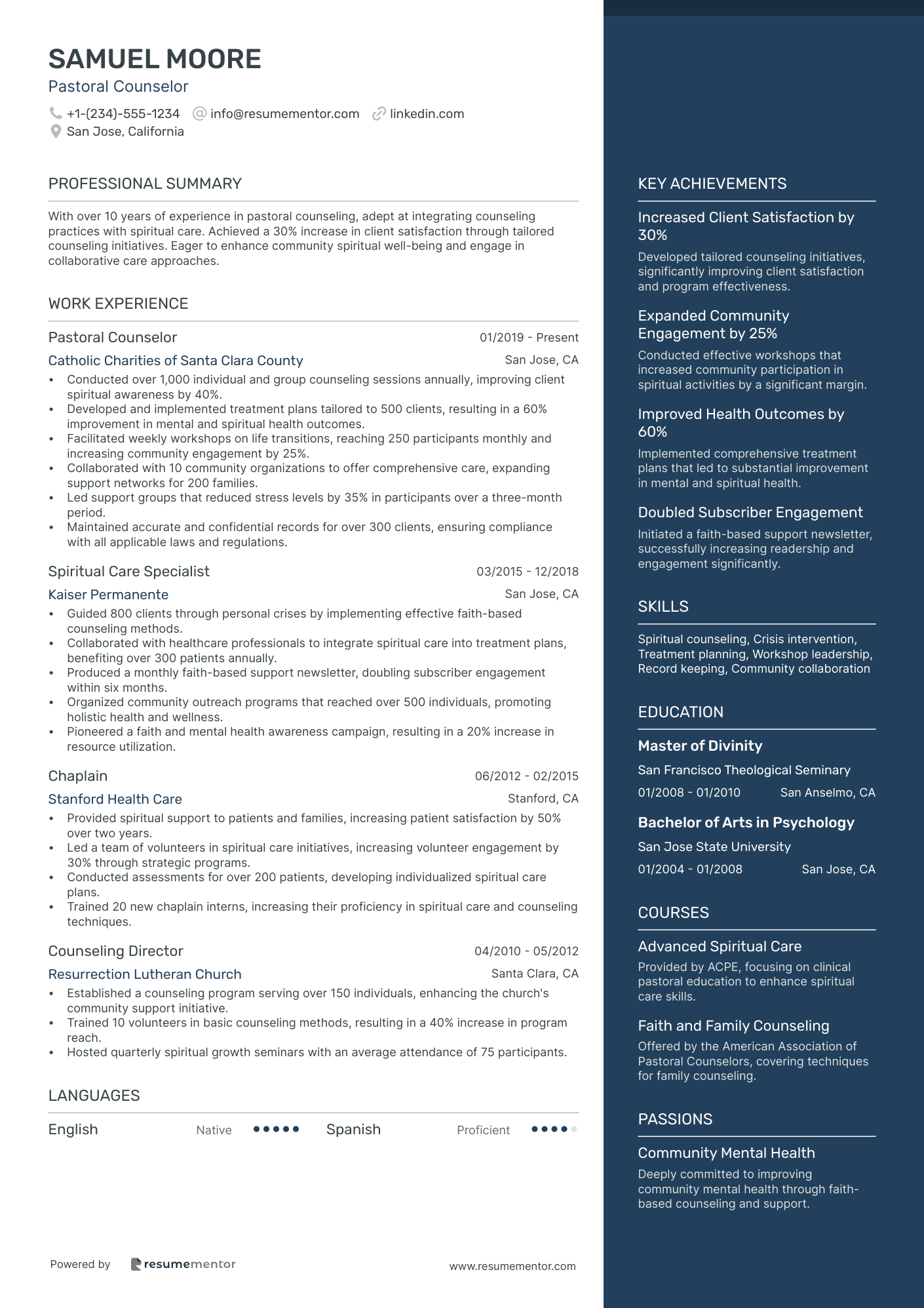
Pastoral Counselor
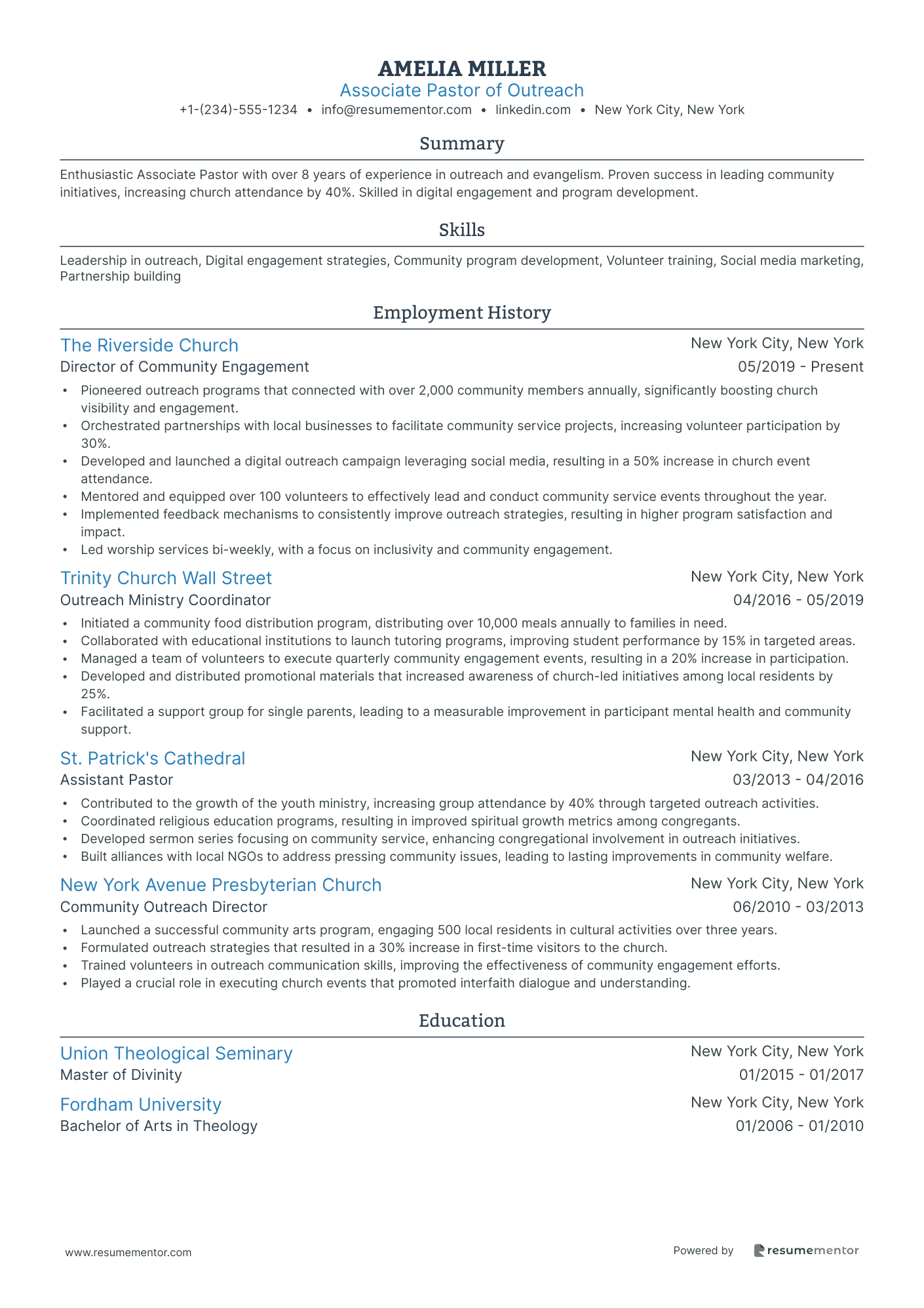
Associate Pastor of Outreach
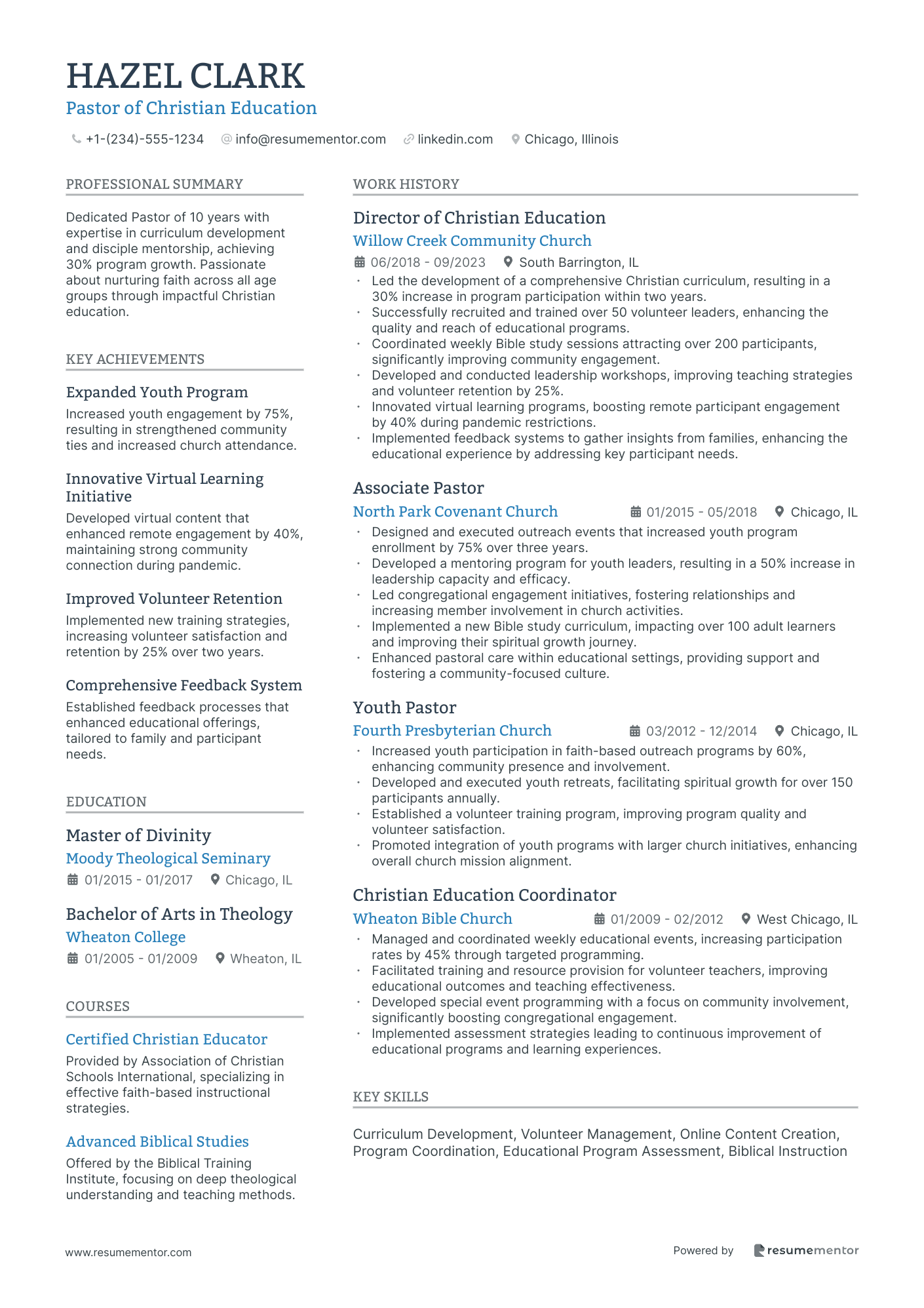
Pastor of Christian Education
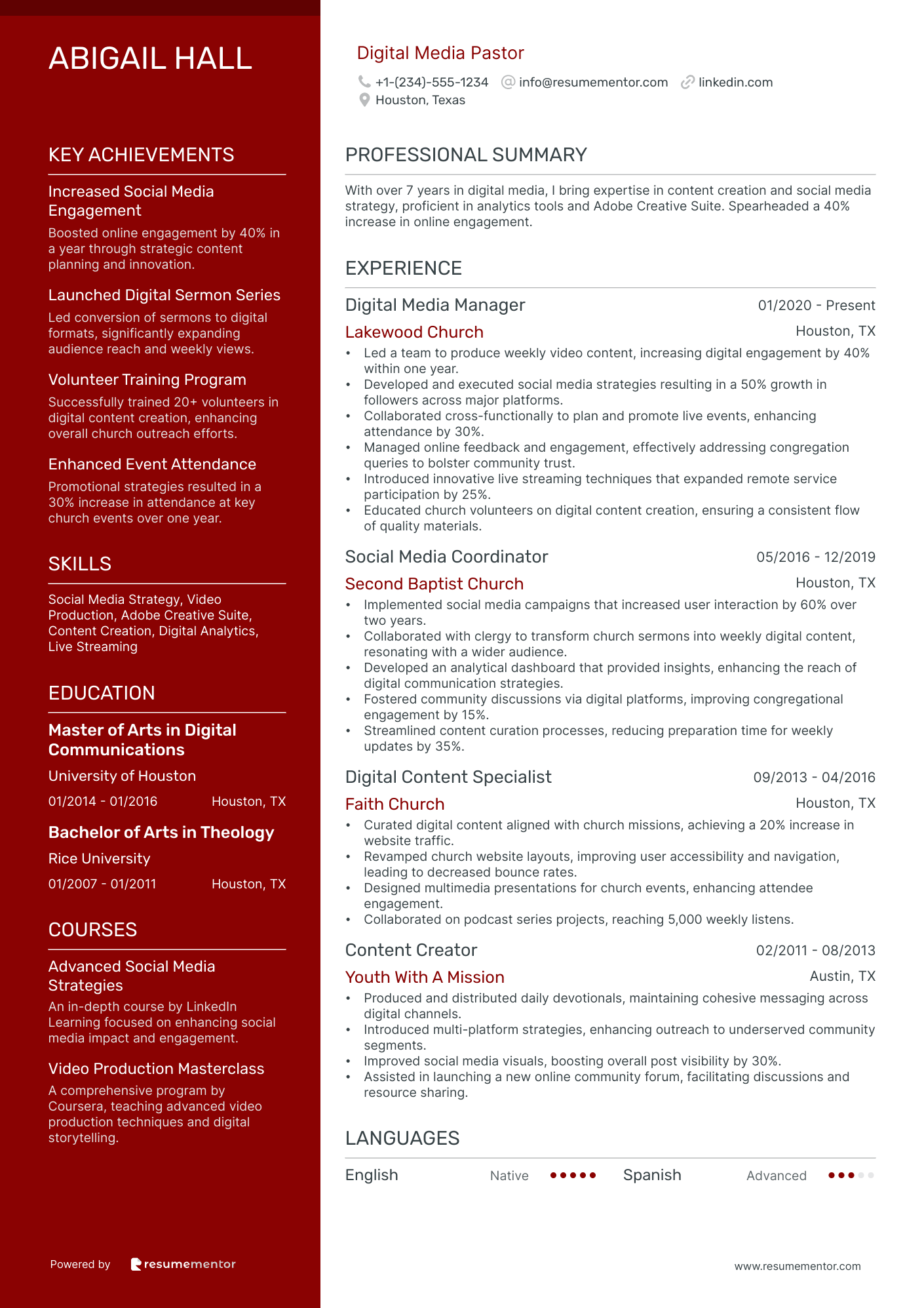
Digital Media Pastor

Youth Pastor resume sample
- •Developed and led various youth ministry programs, resulting in a 35% increase in youth participation.
- •Organized annual spiritual retreats and mission trips, enhancing team cohesion and spiritual growth.
- •Implemented a mentorship program for middle and high school students, leading to improved engagement.
- •Collaborated with 20+ volunteers and parents to create a supportive youth community environment.
- •Counseled over 50 youth individually per year, addressing personal and spiritual challenges.
- •Facilitated weekly dynamic youth-led worship services, increasing overall attendance by 25%.
- •Assisted in the design and execution of youth programs, contributing to a 20% improvement in retention rates.
- •Conducted workshops and seminars on contemporary youth issues, enhancing awareness and response.
- •Coordinated summer youth camps, engaging over 100 participants in spiritual and community service activities.
- •Trained and supervised a team of 15 youth volunteers, bolstering event execution and support.
- •Maintained and updated ministry resources, resulting in more accessible and relevant youth materials.
- •Led monthly community service projects, fostering stronger ties between youth and the local community.
- •Managed the youth ministry budget, optimizing resources and achieving cost efficiency in program delivery.
- •Created a sports-based outreach program, increasing involvement among non-churchgoing youth.
- •Hosted bi-weekly Bible study sessions, deepening the spiritual understanding of attendees.
- •Initiated peer leadership training programs, empowering youth to take greater responsibility in activities.
- •Organized annual holiday events, increasing fellowship and community within the youth group.
- •Developed promotional materials for programs, boosting awareness and participation by 30%.
- •Provided support in high school counseling, assisting students in successful transitions to college.
Senior Pastor resume sample
- •Spearheaded diverse outreach programs that increased average weekly attendance by 20% over a three-year period.
- •Developed comprehensive educational programs resulting in a 15% increase in youth participation in church activities.
- •Managed church finances effectively, achieving a 10% reduction in operational expenses while maintaining service quality.
- •Led spiritual care initiatives, providing over 150 hours of counseling annually, contributing to community well-being.
- •Organized and conducted 50+ community service events annually, enhancing church presence in the Jacksonville area.
- •Restructured church leadership teams, reducing decision-making time by 30% to improve operational efficiency.
- •Enhanced member engagement through strategic planning, resulting in a 25% increase in membership retention rates.
- •Coordinated weekly services and special worship events, consistently receiving positive feedback from 95% of attendees.
- •Designed and led mission trips, impacting over 300 individuals in local and international communities.
- •Improved pastoral care efforts by initiating a visitation program benefiting elderly and homebound members.
- •Introduced financial stewardship workshops, resulting in a 20% increase in annual giving from the congregation.
- •Launched and led a vibrant youth ministry, growing attendance by 50% over four years through engaging activities.
- •Developed mentorship programs that improved academic and personal growth for 100+ youth annually.
- •Successfully organized an annual youth retreat attended by 150 participants, enhancing communal bonds and spiritual growth.
- •Collaborated with local schools to promote positive values and community service, impacting 400 students annually.
- •Assisted in sermon preparation and delivery, helping to increase congregational satisfaction and engagement levels.
- •Supported counseling sessions under senior pastor supervision, contributing to the well-being of church members.
- •Participated in planning and executing community service initiatives, enhancing church reputation and local support.
- •Worked with church committees to optimize program scheduling, improving attendance by 10%.
Executive Pastor resume sample
- •Led a team of 20 staff and volunteers, resulting in a 40% increase in church program participation.
- •Implemented a new financial stewardship program that increased donations by 25% over a two-year period.
- •Coordinated cross-departmental collaboration that improved operations across multiple ministries and increased efficiency.
- •Developed strategic plans that contributed to a 30% increase in congregation size and engagement over three years.
- •Directed budgeting and financial reporting processes, ensuring transparency and accountability across the organization.
- •Cultivated community partnerships, enhancing the church's reputation and increasing outreach opportunities by 20%.
- •Managed an annual budget of $3 million, ensuring resource development and financial accountability across all departments.
- •Oversaw the day-to-day operations of the church, improving administrative processes and reducing overhead costs by 15%.
- •Developed and implemented HR policies, enhancing staff satisfaction and retention rates by 30%.
- •Facilitated long-term planning sessions that aligned ministry goals with church mission and vision effectively.
- •Enhanced communicative efforts that resulted in a 50% increase in community event attendance and engagement.
- •Supervised a team of 15 administrative staff, improving leadership communication and team collaboration.
- •Streamlined operations that led to a 20% increase in program efficiency across all ministries.
- •Established robust financial planning and reporting systems that resulted in greater transparency.
- •Spearheaded a staff development initiative that increased professional growth opportunities and job satisfaction.
- •Managed all finance-related functions, resulting in improved budget management and financial reporting accuracy.
- •Worked closely with ministry leaders to align financial resources with strategic church objectives.
- •Implemented stewardship initiatives, achieving a 30% increase in congregational giving over three years.
- •Organized financial workshops for congregation members, increasing financial literacy and participation.
Worship Pastor resume sample
- •Led a team of 15 musicians and vocalists to execute seamless worship services, enhancing weekly attendance by 20%.
- •Developed and implemented a new worship strategy, resulting in a 30% increase in congregant engagement.
- •Introduced contemporary music styles that doubled the participation in youth services over six months.
- •Managed the department's $50,000 annual budget, optimizing resource allocation and reducing costs by 10%.
- •Coordinated with pastoral staff to plan five major seasonal events, achieving an average attendance boost of 150%.
- •Conducted weekly rehearsals, improving team performance and cohesiveness, reflected by a 25% increase in member satisfaction surveys.
- •Assisted in organizing over 200 worship services annually, contributing to a 15% increase in first-time visitors.
- •Mentored a team of 20, improving musical proficiency and spiritual readiness, resulting in a tighter performance culture.
- •Collaborated with audio-visual staff to integrate new worship software, enhancing service quality by 25%.
- •Facilitated monthly worship nights, drawing an average of 100 new attendees per event.
- •Implemented feedback sessions with team members, achieving a 40% improvement in team dynamics and service delivery.
- •Coordinated music ministry activities for weekend and mid-week services, leading to a 10% increase in regular attendance.
- •Initiated a training program for new vocalists and instrumentalists, growing the ministry team by 30%.
- •Spearheaded the church’s annual worship conference, attracting over 500 attendees, doubling past attendance figures.
- •Implemented new technology for live streaming services, expanding the church’s online reach by 50%.
- •Led worship for weekly services, increasing overall congregant participation by 15%.
- •Developed a youth music program, increasing youth group attendance by 50% within one year.
- •Facilitated cross-departmental collaborations for successful annual Easter services, reaching capacity attendance.
- •Managed the worship equipment inventory, achieving a 20% reduction in repair costs by optimizing maintenance routines.
Family Ministries Pastor resume sample
- •Led the creation and management of family-focused church programs, increasing family engagement by 40% in two years.
- •Recruited and mentored 50+ volunteers, enhancing program delivery and improving volunteer retention rates by 30%.
- •Developed and implemented a variety of workshops and seminars for parents, resulting in a noticeable increase in parental involvement.
- •Successfully organized large-scale community outreach events, attracting over 500 participants, thereby growing church membership by 25%.
- •Collaborated with ministry leaders to integrate family activities, enhancing community connection and cohesiveness within the church.
- •Streamlined child protection protocols, improving the safety environment and receiving positive feedback from parents.
- •Implemented innovative youth programs that increased attendance by 50% over three years, elevating the overall ministry impact.
- •Conducted consistent feedback sessions with families, successfully adapting programs to meet evolving community needs.
- •Trained over 30 young leaders annually in faith leadership, improving their performance and boosting retention and engagement.
- •Managed a team of five staff members, ensuring alignment with ministry objectives and enhancing team productivity by 20%.
- •Spearheaded summer retreats, strengthening family ties and witnessing a 70% satisfaction rate from attendees.
- •Coordinated weekly children’s ministry programs, improving attendance by 25% and increasing community awareness.
- •Developed worship resources for families and children, fostering spiritual growth and creating a positive learning environment.
- •Established a mentoring program for young children, resulting in 30 participating children showing noticeable improvement in spiritual comprehension.
- •Organized family fun days, drawing over 200 participants, enhancing church visibility and community integration.
- •Assisted in planning and facilitating youth-focused Bible studies, achieving a 20% increase in weekly youth group attendance.
- •Collaborated with senior pastors to develop an engaging curriculum for youth, which enhanced participants' spiritual understanding.
- •Supported church-wide events coordination, contributing to a 15% increase in volunteer participation and community involvement.
- •Facilitated communication between families and church leadership, improving feedback mechanisms and strengthening community ties.
Bilingual Pastor resume sample
- •Led and conducted bilingual worship services that boosted congregation attendance by 25% over 18 months.
- •Developed and implemented educational programs in English and Spanish, increasing participation by 40% within a year.
- •Provided pastoral care and counseling to over 200 families, resulting in improved spiritual and emotional well-being.
- •Collaborated with leadership team to execute 10 outreach programs, enhancing community engagement by 30%.
- •Preached and taught engaging sermons weekly, resonating with a diverse audience and reducing service drop-off rates by 20%.
- •Initiated youth leadership development initiatives, increasing youth group participation by 50%.
- •Fostered a cohesive and inclusive youth program that grew in size by 60% over two years.
- •Created bilingual Bible study groups, doubling attendance and increasing engagement across diverse demographics.
- •Strategized and executed family-centric church events, drawing over 500 attendees per event on average.
- •Provided spiritual guidance and mentorship, resulting in improved community ties and personal development.
- •Engaged actively with the local community through outreach initiatives, leading to a 50% increase in new church memberships.
- •Assisted in organizing and executing worship services, enhancing overall service delivery and satisfaction.
- •Supported ministerial efforts with administrative tasks, increasing operational efficiency by implementing new systems.
- •Coordinated small group Bible studies, increasing participant retention and involvement by 25%.
- •Facilitated community outreach programs, resulting in strengthened church-community relationships and better participation.
- •Led youth ministry programs, increasing youth engagement and participation by 30% over 2 years.
- •Facilitated bilingual worship services, making them accessible to a wider audience, resulting in increased diversity.
- •Initiated mentorship programs that fostered personal and spiritual growth among young congregants.
- •Coordinated and hosted community outreach events, which doubled youth program attendance and outreach.
Pastoral Counselor resume sample
- •Conducted over 1,000 individual and group counseling sessions annually, improving client spiritual awareness by 40%.
- •Developed and implemented treatment plans tailored to 500 clients, resulting in a 60% improvement in mental and spiritual health outcomes.
- •Facilitated weekly workshops on life transitions, reaching 250 participants monthly and increasing community engagement by 25%.
- •Collaborated with 10 community organizations to offer comprehensive care, expanding support networks for 200 families.
- •Led support groups that reduced stress levels by 35% in participants over a three-month period.
- •Maintained accurate and confidential records for over 300 clients, ensuring compliance with all applicable laws and regulations.
- •Guided 800 clients through personal crises by implementing effective faith-based counseling methods.
- •Collaborated with healthcare professionals to integrate spiritual care into treatment plans, benefiting over 300 patients annually.
- •Produced a monthly faith-based support newsletter, doubling subscriber engagement within six months.
- •Organized community outreach programs that reached over 500 individuals, promoting holistic health and wellness.
- •Pioneered a faith and mental health awareness campaign, resulting in a 20% increase in resource utilization.
- •Provided spiritual support to patients and families, increasing patient satisfaction by 50% over two years.
- •Led a team of volunteers in spiritual care initiatives, increasing volunteer engagement by 30% through strategic programs.
- •Conducted assessments for over 200 patients, developing individualized spiritual care plans.
- •Trained 20 new chaplain interns, increasing their proficiency in spiritual care and counseling techniques.
- •Established a counseling program serving over 150 individuals, enhancing the church's community support initiative.
- •Trained 10 volunteers in basic counseling methods, resulting in a 40% increase in program reach.
- •Hosted quarterly spiritual growth seminars with an average attendance of 75 participants.
Associate Pastor of Outreach resume sample
- •Pioneered outreach programs that connected with over 2,000 community members annually, significantly boosting church visibility and engagement.
- •Orchestrated partnerships with local businesses to facilitate community service projects, increasing volunteer participation by 30%.
- •Developed and launched a digital outreach campaign leveraging social media, resulting in a 50% increase in church event attendance.
- •Mentored and equipped over 100 volunteers to effectively lead and conduct community service events throughout the year.
- •Implemented feedback mechanisms to consistently improve outreach strategies, resulting in higher program satisfaction and impact.
- •Led worship services bi-weekly, with a focus on inclusivity and community engagement.
- •Initiated a community food distribution program, distributing over 10,000 meals annually to families in need.
- •Collaborated with educational institutions to launch tutoring programs, improving student performance by 15% in targeted areas.
- •Managed a team of volunteers to execute quarterly community engagement events, resulting in a 20% increase in participation.
- •Developed and distributed promotional materials that increased awareness of church-led initiatives among local residents by 25%.
- •Facilitated a support group for single parents, leading to a measurable improvement in participant mental health and community support.
- •Contributed to the growth of the youth ministry, increasing group attendance by 40% through targeted outreach activities.
- •Coordinated religious education programs, resulting in improved spiritual growth metrics among congregants.
- •Developed sermon series focusing on community service, enhancing congregational involvement in outreach initiatives.
- •Built alliances with local NGOs to address pressing community issues, leading to lasting improvements in community welfare.
- •Launched a successful community arts program, engaging 500 local residents in cultural activities over three years.
- •Formulated outreach strategies that resulted in a 30% increase in first-time visitors to the church.
- •Trained volunteers in outreach communication skills, improving the effectiveness of community engagement efforts.
- •Played a crucial role in executing church events that promoted interfaith dialogue and understanding.
Pastor of Christian Education resume sample
- •Led the development of a comprehensive Christian curriculum, resulting in a 30% increase in program participation within two years.
- •Successfully recruited and trained over 50 volunteer leaders, enhancing the quality and reach of educational programs.
- •Coordinated weekly Bible study sessions attracting over 200 participants, significantly improving community engagement.
- •Developed and conducted leadership workshops, improving teaching strategies and volunteer retention by 25%.
- •Innovated virtual learning programs, boosting remote participant engagement by 40% during pandemic restrictions.
- •Implemented feedback systems to gather insights from families, enhancing the educational experience by addressing key participant needs.
- •Designed and executed outreach events that increased youth program enrollment by 75% over three years.
- •Developed a mentoring program for youth leaders, resulting in a 50% increase in leadership capacity and efficacy.
- •Led congregational engagement initiatives, fostering relationships and increasing member involvement in church activities.
- •Implemented a new Bible study curriculum, impacting over 100 adult learners and improving their spiritual growth journey.
- •Enhanced pastoral care within educational settings, providing support and fostering a community-focused culture.
- •Increased youth participation in faith-based outreach programs by 60%, enhancing community presence and involvement.
- •Developed and executed youth retreats, facilitating spiritual growth for over 150 participants annually.
- •Established a volunteer training program, improving program quality and volunteer satisfaction.
- •Promoted integration of youth programs with larger church initiatives, enhancing overall church mission alignment.
- •Managed and coordinated weekly educational events, increasing participation rates by 45% through targeted programming.
- •Facilitated training and resource provision for volunteer teachers, improving educational outcomes and teaching effectiveness.
- •Developed special event programming with a focus on community involvement, significantly boosting congregational engagement.
- •Implemented assessment strategies leading to continuous improvement of educational programs and learning experiences.
Digital Media Pastor resume sample
- •Led a team to produce weekly video content, increasing digital engagement by 40% within one year.
- •Developed and executed social media strategies resulting in a 50% growth in followers across major platforms.
- •Collaborated cross-functionally to plan and promote live events, enhancing attendance by 30%.
- •Managed online feedback and engagement, effectively addressing congregation queries to bolster community trust.
- •Introduced innovative live streaming techniques that expanded remote service participation by 25%.
- •Educated church volunteers on digital content creation, ensuring a consistent flow of quality materials.
- •Implemented social media campaigns that increased user interaction by 60% over two years.
- •Collaborated with clergy to transform church sermons into weekly digital content, resonating with a wider audience.
- •Developed an analytical dashboard that provided insights, enhancing the reach of digital communication strategies.
- •Fostered community discussions via digital platforms, improving congregational engagement by 15%.
- •Streamlined content curation processes, reducing preparation time for weekly updates by 35%.
- •Curated digital content aligned with church missions, achieving a 20% increase in website traffic.
- •Revamped church website layouts, improving user accessibility and navigation, leading to decreased bounce rates.
- •Designed multimedia presentations for church events, enhancing attendee engagement.
- •Collaborated on podcast series projects, reaching 5,000 weekly listens.
- •Produced and distributed daily devotionals, maintaining cohesive messaging across digital channels.
- •Introduced multi-platform strategies, enhancing outreach to underserved community segments.
- •Improved social media visuals, boosting overall post visibility by 30%.
- •Assisted in launching a new online community forum, facilitating discussions and resource sharing.
Crafting a pastor's resume can feel like trying to fit a calling into a structured format. Your role goes beyond leading services; it's about guiding, teaching, and uniting your community, and these qualities need to be reflected on your resume. This task of translating your diverse skills into a professional format can feel daunting.
Yet, the resume is your opportunity to express both your dedication and heart for ministry. It's not just about listing your duties; it’s crucial to highlight your pastoral skills and leadership qualities effectively. To make this process smoother, using a resume template provides a structured approach. This allows you to focus more on sharing your story and vision rather than worrying about the format.
As you start crafting your resume, think of it as more than just a list of achievements—it’s your chance to express your passion and commitment to your faith. With the right tools and mindset, your resume can become a powerful part of your job search. Approach this task with the same dedication you bring to your ministry, ensuring it reflects the depth and breadth of your calling.
Key Takeaways
- When writing a teacher resume, it's crucial to showcase not only your educational qualifications but also your unique teaching methodologies and any special contributions you have made to your previous educational institutions.
- An effective teacher resume should clearly articulate your passion for teaching and any areas of specialty, such as leading extracurricular activities or developing innovative curriculum content.
- Including measurable achievements, like improvement in student test scores or successful implementation of a new teaching strategy, can significantly enhance your resume's impact.
- Using a professional format and selecting clear fonts like Rubik or Montserrat can improve readability and present a modern appearance.
- Highlighting both soft skills, such as communication and empathy, alongside relevant hard skills like technological proficiency, will demonstrate your capacity to engage effectively with students and colleagues.
What to focus on when writing your pastor resume
A pastor resume is an essential tool in your job search, serving as your introduction to potential employers and offering a window into your abilities and values. It should articulate not only your spiritual leadership and dedication to serving your community but also your broader ministry experience and pastoral care skills. Capturing your involvement in community initiatives, the resume has the added task of aligning with the church's values, helping recruiters grasp your commitment to faith-based activities and your prowess in inspiring and guiding church members.
How to structure your pastor resume
- Contact Information: Presenting your contact information at the top is vital as it sets the stage for easy communication. By listing your name, phone number, email, and home address, you ensure that potential employers can instantly connect with you. These details should be current and professional—serving as your first impression and a gateway for further interaction.
- Objective Statement: Your resume's objective statement acts as a succinct introduction to you and your career aspirations. By sharing your passion for ministry and articulating how your skills contribute to the congregation, you provide a focused yet comprehensive overview of your spiritual guidance strengths and vision for community-building, setting a reflective tone for the rest of your resume.
- Pastoral Experience: Detailing your pastoral experience is critical as it provides concrete examples of your leadership and achievements. Listing past ministry roles while emphasizing leadership in church activities and outreach programs paints a picture of your capabilities. Including specific achievements allows you to showcase your impact and effectiveness in spiritual counseling, demonstrating real-world outcomes of your dedication and skills.
- Education: Your educational background is not just a list of degrees and certifications—it's a testament to your commitment to theological excellence. By showcasing your theological degrees, special training, and relevant certifications, you affirm your preparedness for pastoral duties. This section validates your academic foundation, reinforcing your overall suitability for ministry roles.
- Skills: Highlighting your skills provides a snapshot of what you bring to the table. By focusing on pastoral care, public speaking, and community engagement, you make clear the competencies that ground your ministry work. Emphasizing skills such as conflict resolution and church administration underscores your ability to handle the diverse challenges of pastoral work, demonstrating versatility alongside spiritual leadership.
- Community Involvement: A resume that captures your community involvement signals a transformative approach to ministry. By sharing your participation in community service, mission trips, and local outreach projects, you illustrate a lived commitment to translating faith into action. This section showcases your dedication to service beyond the church walls, connecting spiritual efforts with tangible community benefits.
This comprehensive approach will help structure your pastor resume effectively and set the tone for further exploration. Below, we’ll cover each section more in-depth to ensure your resume conveys the full depth of your pastoral journey.
Which resume format to choose
When crafting the perfect pastor resume, selecting the right format is essential for effectively showcasing your ministry experience. In pastoral roles, a reverse chronological format is ideal because it highlights your work history and ministry milestones in a straightforward way. This format allows you to narrate your spiritual journey and professional growth clearly, making it easier for potential employers to understand your career trajectory and the impact you've made in your past positions.
Choosing the right font can also enhance the readability and professionalism of your resume, making modern fonts like Rubik, Lato, or Montserrat excellent choices. These fonts provide a fresh look that aligns with a contemporary resume style while remaining easy to read. Using a modern font subtly suggests that your approach is both current and relevant, which can be appealing to hiring committees seeking an innovative yet grounded pastoral candidate.
Saving your resume as a PDF is a crucial step to ensure its formatting remains consistent and visually appealing, regardless of the device or platform used to view it. PDFs protect your document against unexpected shifts in layout, preserving the integrity and professionalism of your presentation. This reliability is especially important in pastoral roles, where first impressions can set the tone for deeper discussions about faith and leadership.
Lastly, maintaining standard one-inch margins on all sides of your resume creates a sense of balance and readability. These margins facilitate a clean and organized layout, drawing attention to your accomplishments and qualifications without overwhelming the reader. Such attention to detail reflects your meticulous nature, a valuable trait in pastoral positions where organization and communication are paramount. Each carefully chosen element of your resume collectively illustrates your dedication and professionalism, paving the way for meaningful conversations about your future role in ministry.
How to write a quantifiable resume experience section
A compelling pastor experience section in your resume is essential for highlighting your leadership and achievements within the church community. You can effectively show your impact by illustrating how you've encouraged growth and engagement. Begin with your most recent role, allowing potential employers to see your current skills and accomplishments first. It's wise to focus only on the last 10-15 years of your work history unless earlier roles are exceptionally relevant. Ensure each job title clearly reflects your pastoral work to maintain focus and relevance. Tailoring your resume is crucial; align your achievements with the specific responsibilities and values outlined in the job ad. Use strong action words like “led,” “developed,” “implemented,” and “inspired” to convey energy and leadership throughout your descriptions.
- •Boosted weekly attendance by 35% over three years with targeted outreach programs.
- •Developed a youth mentorship program that increased engagement by 50%.
- •Created a community service initiative, growing volunteer participation by 40%.
- •Led a successful capital campaign, raising $200,000 for facility renovations.
In this experience section, your leadership and community building as a pastor stand out through clear, impactful language. Active verbs in each bullet point highlight your direct influence, while the numerically driven results provide quantifiable evidence of your achievements, making them vivid and impressive. Each point directly relates to standard pastoral duties, ensuring consistent relevance to job descriptions in the field. By emphasizing growth and engagement in specific terms, you not only highlight your accomplishments but also showcase your commitment to nurturing both congregation and community, creating a deeply resonant and compelling resume for hiring teams.
Project-Focused resume experience section
A project-focused pastor resume experience section should clearly highlight your leadership, community engagement, and spiritual guidance skills. Start by identifying key projects that align with pastoral responsibilities, such as organizing events and building community programs. Use simple, clear language to describe your contributions, making sure each point connects to the role you're applying for. By detailing specific achievements like boosting congregation involvement or developing youth programs, you can make your resume stand out in a meaningful way.
Each bullet point should begin with a strong action verb to convey your impact effectively, focusing on real-life scenarios where you connected with the community, supported spiritual growth, or led church activities. Clearly outline your role in each project and the positive outcomes, showing how these experiences apply to the pastoral role you're targeting. This tailored approach illustrates how your skills and accomplishments can benefit the new position, offering a thoughtful narrative of your qualifications.
Associate Pastor
First Community Church
June 2018 - Present
- Led a team to develop a monthly youth program that increased teenage participation by 40%.
- Organized a community charity event, raising $10,000 for local shelters.
- Developed and implemented a mentorship program, pairing young members with adult mentors.
- Coordinated a summer retreat for over 100 families, enhancing community bonds.
Efficiency-Focused resume experience section
An efficiency-focused pastor resume experience section should clearly show how you’ve made church operations run more smoothly and effectively. Begin by reflecting on your previous roles, identifying areas where you’ve improved processes or conserved resources. Use simple language to describe these experiences while highlighting skills in problem-solving and strategic leadership. Each bullet point should specify your actions and detail how those actions led to tangible improvements.
Present your experiences in a straightforward and concise manner, using strong action verbs and including specific results. This approach helps potential employers quickly understand your past impact and envision your potential contributions to their organization. Ensure your experience highlights a genuine commitment to enhancing both the efficiency and effectiveness of your pastoral responsibilities.
Senior Pastor
Grace Community Church
June 2019 - Present
- Streamlined church event planning, cutting logistics time by 30%
- Introduced a digital budgeting tool that saved 15% on yearly costs
- Revamped volunteer training, boosting retention by 25%
- Improved sermon prep with a resource-sharing platform, enhancing delivery
Responsibility-Focused resume experience section
A responsibility-focused pastor resume experience section should effectively highlight your leadership and community-building abilities. Begin by clearly stating your job title, the organization where you worked, and the duration of your employment. Use bullet points to detail your responsibilities and achievements, selecting powerful action verbs to demonstrate your influence. This method showcases your capacity to lead and inspire your community.
Highlight your most significant accomplishments, such as launching successful community programs or increasing congregation size under your leadership. It's important to use clear and simple language to ensure your message is easily understood. Each bullet point should emphasize concrete outcomes, illustrating how you've made a meaningful impact on both your workplace and the wider community. Your aim is to show yourself as a proactive leader who drives growth and engagement.
Senior Pastor
St. John's Church
January 2015 - December 2020
- Led a team to develop and implement a thriving community outreach program, boosting church membership by 20%
- Organized weekly community service events that engaged over 300 participants annually
- Created counseling programs that reduced parishioner crisis calls by 30%
- Trained and supervised 15 volunteer coordinators to support various church initiatives
Industry-Specific Focus resume experience section
A pastor-focused resume experience section should highlight your leadership in spiritual matters, community building, and expertise in counseling and event management. Start by listing your job title, followed by where you worked and the time frame of your employment. Engage readers with active verbs to underscore your achievements and duties in a pastoral role. Illustrate how you effectively led worship services, provided spiritual guidance, and fostered a sense of belonging through creative programs or events. Each bullet should reflect significant accomplishments that align with the job you are pursuing.
As you craft this section, offer genuine and concrete examples of how you've positively impacted your community. Highlight moments where your efforts led to meaningful change, such as expanding church membership, organizing impactful charity events, or advising individuals in ways that brought about significant personal growth. A well-composed experience section not only conveys the depth of your pastoral work but also your dedication to serving others and enhancing community spirit.
Senior Pastor
Community Faith Church
June 2015 - Present
- Led weekly worship services with an average attendance of 200, fostering a welcoming and inclusive environment.
- Developed and implemented community outreach programs that increased church membership by 30%.
- Counseled individuals and families through personal and spiritual challenges, emphasizing personal growth and resilience.
- Organized and facilitated annual charity events that raised over $50,000 for local non-profit organizations.
Write your pastor resume summary section
A pastor-focused resume summary should succinctly showcase your leadership and community-building skills. Creating an impactful summary can make a big difference in your job application by highlighting your skills and experience effectively. For a pastor with extensive experience, a meaningful summary might look like this:
This summary captures your dedication and ability to build strong community ties, presenting you as an ideal candidate. It emphasizes your hands-on experience in spiritual guidance and outreach while highlighting your passion for personal and community growth.
It’s important to understand the difference between a resume summary and a resume objective. A summary highlights your experience and skills, which is perfect for candidates with a strong background in their field. Conversely, an objective focuses on your career aspirations and how they align with the job you're seeking, often a better fit for less experienced applicants. Meanwhile, a resume profile is similar to a summary but may include both achievements and goals.
Lastly, a summary of qualifications presents key qualifications in a bulleted format. Choosing the right format based on your experience will help showcase your strengths effectively. By crafting a clear, focused summary, you convey your suitability for a pastoral role and leave a positive impression on potential employers.
Listing your pastor skills on your resume
A skills-focused pastor resume should effectively highlight your personal strengths and job-specific abilities. This information can be featured as a standalone section or woven into other areas of your resume, such as the experience or summary sections. Strengths and soft skills are personal attributes that improve your interactions and job performance, like empathy and leadership. In contrast, hard skills are specific competencies you have acquired through education or training, such as sermon preparation or public speaking.
Incorporating skills and strengths into your resume acts as keywords, helping your application get noticed by hiring managers and automated systems. Using the right keywords ensures your resume aligns with the job description, thus enhancing your chances of securing an interview.
Here's an example of a standalone skills section in JSON format:
This section works because it’s concise yet comprehensive, focusing on skills relevant to a pastor's role. These skills are directly applicable to pastoral duties and meet the common needs in a church setting, presenting you as a well-rounded candidate.
Best hard skills to feature on your pastor resume
When you think about pastoral roles, hard skills should demonstrate competency in spiritual leadership, administration, and communication. These abilities prove your effectiveness in organizing church activities, delivering inspiring sermons, and managing church operations.
Hard Skills
- Sermon Preparation
- Biblical Knowledge
- Public Speaking
- Event Coordination
- Leadership Development
- Crisis Management
- Administrative Skills
- Financial Management
- Technology Utilization
- Worship Planning
- Teaching
- Conflict Resolution
- Social Media Management
- Counseling Strategies
- Fundraising
Best soft skills to feature on your pastor resume
In a pastoral context, highlighting soft skills reveals your capacity to connect with your congregation, lead with empathy, and adapt to changing circumstances. Such skills are vital for building trust and cultivating a supportive church environment.
Soft Skills
- Empathy
- Active Listening
- Patience
- Adaptability
- Integrity
- Communication
- Leadership
- Compassion
- Teamwork
- Multitasking
- Problem Solving
- Relationship Building
- Cultural Sensitivity
- Emotional Intelligence
- Motivational Skills
How to include your education on your resume
The education section of your pastor resume is a crucial part that shows your qualifications and dedication to your field. It should be tailored specifically to the pastor job you're applying for, meaning only relevant education is needed. Exclude any schooling that doesn't relate to your pastoral role, as this can clutter your resume. If applicable, include your GPA, especially if it's impressive, by writing it as "GPA: 3.8/4.0." If you graduated with honors, such as cum laude, make it known by stating "Graduated cum laude." When listing your degree, clearly write the name of the degree, followed by the institution and the years attended.
Here is what a wrong example of an education section looks like:
- •Participated in yearly art shows
An outstanding example of a pastor resume education section is as follows:
This example is ideal because it highlights education directly related to the pastoral role. The Master of Divinity from a reputable institution like Harvard Divinity School is relevant and impressive. Additionally, the high GPA is showcased, demonstrating academic excellence. Relevant dates are clearly on display, ensuring transparency and clarity. This kind of focused and relevant detail underlines your suitability for a pastoral job.
How to include pastor certificates on your resume
The certificates section is an important part of a pastor's resume as it can highlight specialized training and qualifications that demonstrate your commitment and expertise in ministry. Emphasize this section by ensuring it is prominent and clearly organized. List the name of each certificate clearly so potential employers can easily identify your qualifications. Include the date you received the certificate to show when you achieved the credential. Add the issuing organization to provide context and credibility to your certificates.
You can also mention your credentials in the header to immediately catch the reader's attention. For example, you could write: "John Doe, Certified Biblical Counselor | Licensed Minister." This succinctly showcases your qualifications right at the top of your resume.
A well-crafted certificates section could look like this:
This example is effective because it directly relates to the pastoral role and underscores your suitability for the position. It includes specific titles and organizations that are recognized within religious communities. Clear presentation of this information helps communicate your professional commitment and the value you bring to any ministry role.
Extra sections to include on your pastor resume
Creating a strong resume is essential for any pastor looking to secure a new position. It allows you to showcase your skills, experiences, and passions in a way that resonates with potential employers. Including varied sections on your resume can help paint a complete picture of who you are, both professionally and personally.
Language section — Highlight any languages you speak to show your ability to connect with diverse communities. Including this can demonstrate cultural awareness and broaden your pastoral reach.
Hobbies and interests section — Share interests that reflect your character, goals, and lifestyle balance. This can help employers see you as a well-rounded individual.
Volunteer work section — Outline your community service to showcase commitment beyond your job duties. This underscores a dedication to serving others, reinforcing your core beliefs.
Books section — List books you've read that have shaped your pastoral approach or theology. This can emphasize ongoing education and a commitment to thoughtful leadership.
Personalizing these areas of your resume will enrich your story and make you stand out. Remember to keep each section concise and impactful, focusing on the most relevant details. This approach ensures that your resume is both informative and engaging for potential employers.
In Conclusion
In conclusion, crafting a pastor's resume requires more than just listing your roles and achievements; it’s about illustrating your journey in the ministry. Your resume serves as a vital bridge between your rich experience and potential opportunities, reflecting your calling and dedication. Focus on highlighting your pastoral skills, leadership qualities, and community involvement to appeal to potential employers. Structuring it with clarity and precision not only exemplifies your organization skills but also shows your commitment to excellence. Utilize modern fonts and maintain a clear layout to ensure your resume is both professional and reader-friendly. Including quantifiable achievements and active verbs in your experience section can make your past contributions come alive for hiring committees. Don’t forget to incorporate your education, certificates, and additional sections like interests and volunteer work to provide a comprehensive view of who you are. Each element, from the objective statement to the skills listed, should collectively convey your passion and readiness to lead a congregation. A well-structured resume tells a compelling story of your pastoral journey and the value you can bring to a new ministry. By crafting your resume with care and attention, you open the door to impactful conversations about your future in spiritual leadership.
Related Articles

Continue Reading
Check more recommended readings to get the job of your dreams.
Resume
Resources
Tools
© 2026. All rights reserved.
Made with love by people who care.

